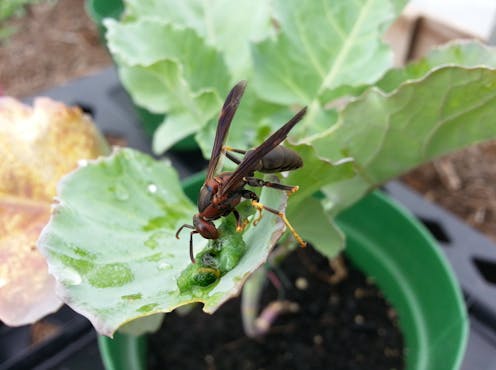Wasps can be pests in NZ – but they have potential to be pest controllers too
- Written by The Conversation

What good are wasps? It’s a question we hear all the time. And, let’s face it, wasps are routinely demonised.
They interrupt picnics (they love beer and fruit as much as we do). Their sting can be painful or even cause an allergic reaction requiring medical treatment. And a swarm of them flying at you is genuinely terrifying.
The beech forests in the northern South Island of New Zealand are home to the world’s highest populations of ground-nesting Vespula wasps, also known as the German or common wasp. So it’s not surprising they get a lot of press, and hardly any of it is positive.
But this reputation is not entirely deserved. In fact, some types of wasp have been shown to be useful in crop pest control – something New Zealand’s horticultural industries may benefit from.
Wasps in New Zealand
Foreign wasps arrived in New Zealand around the middle of the 20th century, after queens stowed away in cargo ships from Europe. The new habitat suited their life cycle, and the wasps thrived.
Like honey bees and bumble bees, the two main “social wasp” groups – Polistes (paper wasps), and Vespula (ground-nesting wasps) – aren’t native. But unlike bees, they are active predators of other insects.
This means they compete for food with native birds and lizards, and can also affect the populations of some endemic insect populations (especially in beech forests). They may also periodically terrorise managed beehives. Consequently, there are nationwide efforts to eradicate social wasps in New Zealand.
But these wasps eat the insects that “bug” us too. Evidence has been mounting for more than 40 years that wasps – particularly Polistes, which are major predators of caterpillars – may be effective at controlling crop pests.
Beneficial predators
In our recent study in the Midwestern United States, we moved wasp colonies into a large, screened cage containing broccoli plants. We then added caterpillars and measured how the presence of wasps affected pest consumption of the plants.
The wasps ate all the caterpillars we set out within three hours. They were clever, too, eventually following us as we put the caterpillars on the crops. We also realised some wasps had worked out how to sneak onto our control plants (from which they were meant to be excluded).
We revised our controls and re-ran the study, this time using a different species of Polistes and a different crop, kale. By day six, all caterpillars from our plants were missing.
The results were clear. Not only can we move Polistes wasp colonies to a new location, but these paper wasps are active predators of crop pests. When wasps were excluded from the broccoli or kale that caterpillars had been added to, pest damage increased. When wasps were allowed to hunt, the crops prospered.
Like Vespula wasps, Polistes can sting if their nest is disturbed. But unlike Vespula, Polistes build small nests under the eaves of buildings. Their nests are relatively easy to remove and relocate to a better spot.
By relocating Polistes wasps into these boxes, we can move nests into small areas or distribute around a crop field. The boxes also act as a buffer to reduce the chances of disturbing the nest and being stung.
Polistes wasps seek and destroy caterpillar pests on broccoli plants.Pest control potential
If you watch wasps long enough, you can observe them carrying pests away from your home garden, local park or farm.
So, could Polistes be harnessed as a pest controller in New Zealand? Our research suggests they hold biocontrol potential for garden pests. But more research is needed to determine how effective that might be, and to ensure they are targeting pests and minimising their impact on native species.
Ours is also not the first study to highlight the benefits of social wasps. Beyond pest control, wasps are effective flower pollinators and help spread yeasts on grapes that improve wine quality. Wasp venoms are now being harnessed as medicines, including as a possible cancer treatment.
Overall, we argue wasps should not be uniformly demonised. They exhibit complex social behaviours to rival anything on Game of Thrones. And they were the original paper manufacturers, turning dry wood, cardboard or paper into pulp with their saliva to create the nest cells where their larvae will grow.
Perhaps one day we can harness them as biocontrol agents targeting crop pests, and reduce reliance on pesticides that can negatively affect beneficial insects such as bees. Like other wasp enthusiasts, we’d like to think their ability to help control pests on valuable crops might one day rehabilitate their reputation.
When we provide Polistes wasps in the lab with different coloured paper every day, they produced a rainbow nest.






